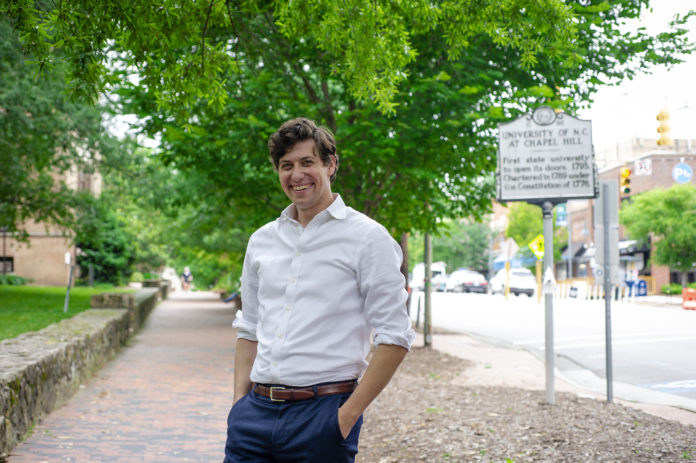
Chapel Hill High School alumnus Jonah Garson is running for a seat in the North Carolina General Assembly, hoping to replace Verla Insko, who will retire after her term ends in 2023.
Garson graduated from Chapel Hill High School in 2005 and currently works as an attorney at Parry Law, PLLC. The UNC-Chapel Hill and Columbia Law School graduate was the former voter protection director for the N.C. Democratic Party, Chair of the Orange County Democratic Party and a member of the Chapel Hill-Carrboro NAACP Executive Committee.
He is running for a seat in North Carolina House District 56, which represents Chapel Hill and Carrboro.
Garson’s platform is focused on funding and strengthening public education, ensuring voting and abortion rights, as well as access to health care, while also protecting the environment and working to stop climate change.
Garson’s activism began at a young age: he was raised in a family of political activists who valued social justice.
His father was a labor organizer for multiple years, and, when Garson attended Chapel Hill High School, he helped UNC students register to vote and protested the American occupation of Iraq in the wake of 9/11.
The terrorist attacks on September 11, 2001—and the political ramifications of the event that became evident when Garson was in high school—motivated Garson to enter politics.
“My big areas of early political activism had to do with protesting direct action against the Iraq War,” he said.
A fellow member of the Class of 2005, Ami Olsen, now a Spanish teacher at Carrboro High School, witnessed the political activism Garson show in his high-school days.
“He was already canvassing back then and was big into the local and national scene, organizing and showing out for teachers and students and the politicians he believed in,” Olsen said.
After investing himself in local politics, Garson committed to learning the law and honing his organizational skills so he could strengthen his fight for increased teacher wages, public safety and environmental protections.
Much of Garson’s political interest was inspired by the project REDMAP, a strategy employed by the Republican State Leadership Committee to maximize the number of Republican politicians in federal and state legislative seats.
”Every ten years, we have this census, when our state legislature redraws our maps and, since the Republicans control the House, they redraw the maps in the way to benefit them,” Garson said.
If districts are redrawn, Garson said, progress made by North Carolina Democrats over the past few years will be in vain: most of their laws will either be reworked or gradually taken away.
Garson is also on guard against the lack of funding and commitment of resources to the state’s public schools.
“The GOP is systematically starving public education,” Garson said. “We know our schools provide so much more than instructional education, providing meals for students and behavioral health support and counseling. We need to be making investments and attracting and retaining teachers of color in this state, particularly Black teachers. We can’t wait any longer.”
Olsen trusts that Garson will listen to people involved in public education, hearing the concerns of educators across the state, as well as those of LGBTQ citizens.
“He has a comprehensive view of public education in his head and actually talks to teachers, students and staff about what our public schools need,” Olsen said. “Jonah has shown me that he will make sure LGBTQ+ folx have a voice in the [North Carolina General Assembly], and he won’t suffer any discriminatory nonsense.”
Garson believes the 2022 election is very important: if the Democrats lose more seats there could be a Republican supermajority in the state, allowing Governor Roy Cooper’s veto to be overridden and for controversial laws to be enacted.
There are currently 120 seats in the North Carolina House of Representatives, where there are 69 Republicans and 51 Democrats. Garson aims both to win a seat and help campaign for other Democrats trying to retain their positions.
The primary election will be on May 17, 2022, and, although it is a foregone conclusion that a Democrat will fill Insko’s seat in November’s election, Garson believes a lot needs to be done to ensure a Democratic victories statewide.
“We need to reimagine how we fight across the state, because, in this current political environment, it’s no exaggeration to say that we are at war for our democracy,” he said. “The only way we’ll win on these policies is by flipping seats and breaking the GOP stranglehold over our North Carolina General Assembly.”











